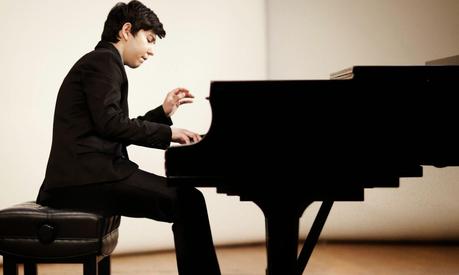by Paul J. Pelkonen

Bezhod Abduraimov.
Photo by Ben Ealavega © 2015 Decca Classics.
These days that the countries of the former Soviet Union are a veritable factory of pianism, turning out a generation of astonishing artists. Mr. Abduraimov hails from Tashkent, the capital city of Uzbekistan in Central Asia. He stunned New Yorkers (including this critic) last month with his performance of Prokofiev's Piano Concerto No. 3 with the Mariinsky Orchestra. http://super-conductor.blogspot.com/2015/01/concert-review-from-exile-to-silence.html So Wednesday night's concert originally a blip on the city's musical radar, suddenly became an in-demand ticket for New Yorkers who know their pianism.
Mr. Abduraimov chose to start the concert with the Four Ballades by Chopin. Each of these unconnected pieces are experiments in form, large-scale "songs without words" that use a verse-and-chorus structure to create poetic expression on the keyboard. From the sonorous opening note of the G minor Ballade, Mr. Abduraimov played with authority and a robust, full pianistic tone. His tempos generally slewed fast, and suggested that the full poetic expression demanded in this music is merely a matter of more life experience.
A hint of gently tolling bells opened the F major Ballade. The playing here was quite beautiful, although one wished for a little more subtlety in the shifting moods and pastel colorations. The A Flat Ballade was joyful, with the suggestion of a dance rhythm in his right hand and a strong and accurate accompaniment from the left. The closing F minor Ballade careened between the sound of wrought emotion and an almost pastoral rocking rhythm. The final cadenza with its difficult flourishes down the keyboard provided an exclamation point to this exuberant interpretation.
"Impromptu" is an innocent, even misleading name for Schubert's single-movement works, perfectly formed bullets of emotional expression that contain great technical challenge in expressing their profound meaning. Mr. Abduraimov balanced youthful energy with eloquence in Impromptu No. 3 in G flat, using the full voice of the piano's bass register to contrast with the noble, singing melody and the flowing accompaniment.
The following Impromptu No. 2 in E flat was more playful in tone, with Mr. Abduraimov navigating the high-speed legato with his right hand and driving the music forward with his left. As the work progressed, the momentum of the left hand sped up and took over the music, pulling the right hand into the dance and bringing the work to a high-spirited close.
Ravel's three-part Gaspard de la Nuit is a standard repertory piece, although its movements with their combination of Impressionistic coloring, clock-like precision and sheer pianistic razzle-dazzle tend to cause cold sweats for even the most seasoned soloist. Mr. Abudraimov's choice to program these works for his first recital was a statement in itself: that this challenging music held no terrors for an artist of his stripe.
He began with Ondine, adding percussive force to the watery theme and building up a great rolling wave of sound across the keyboard. Liquid arpeggios shifted and moved with great subtlety, with the forceful blows from that big right hand accentuating the deadly nature of Ravel's mythical mermaid. The middle movement Le gibet was a painting in black, white and stark grays, with the tramping, shuffling rhythm suggesting zombies along with the nightmarish image of a hanging corpse that is the work's actual subject.
And then it was time for Scarbo, the terrifying, leering dwarf who trips the unwary artist with unexpected pauses, fearsome glissandi along the full length of the keyboard and a score that demands attention to the mostly unexplored extreme bass and treble octaves of the instrument. Mr. Abduraimov took this work head-on, playing the off-the-beat rhythms with precision and pauses that caught the breath in the throat. For his brief encore it was Russian music at last as Mr. played the Etude in D# minor by Alexander Scriabin.

